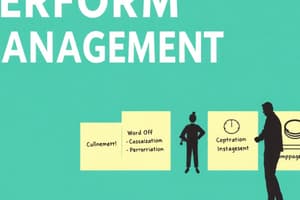Podcast
Questions and Answers
Which of the following best describes the core function of management?
Which of the following best describes the core function of management?
- Ensuring compliance with industry regulations.
- Overseeing daily employee activities and tasks.
- Maintaining employee satisfaction through various incentives.
- Directing human and other resources to efficiently achieve organizational goals. (correct)
What constitutes an organization's resources that managers are responsible for supervising?
What constitutes an organization's resources that managers are responsible for supervising?
- People, skills, knowledge, financial capital, machinery, computers, and I.T. (correct)
- Only financial capital and machinery.
- Physical buildings and land owned by the organization.
- Only the skills, knowledge, and expertise of the employees.
If a manager primarily focuses on minimizing costs while producing goods, which aspect of organizational performance are they emphasizing?
If a manager primarily focuses on minimizing costs while producing goods, which aspect of organizational performance are they emphasizing?
- Innovation
- Adaptability
- Effectiveness
- Efficiency (correct)
What does 'effectiveness' primarily measure in the context of organizational performance?
What does 'effectiveness' primarily measure in the context of organizational performance?
An airline consistently provides on-time flights but struggles with customer complaints due to uncomfortable seating. How would you describe the airline's performance?
An airline consistently provides on-time flights but struggles with customer complaints due to uncomfortable seating. How would you describe the airline's performance?
Which of the following is a key function that managers perform in all types of organizations?
Which of the following is a key function that managers perform in all types of organizations?
During the planning phase of management, what is the primary task?
During the planning phase of management, what is the primary task?
Which of the following activities is central to the organizing function of management?
Which of the following activities is central to the organizing function of management?
Effective leadership extends beyond merely delegating and directing. According to the text, what else does it involve?
Effective leadership extends beyond merely delegating and directing. According to the text, what else does it involve?
What is the main focus of the controlling function in management?
What is the main focus of the controlling function in management?
Top-level managers are primarily responsible for:
Top-level managers are primarily responsible for:
A regional manager who is responsible for implementing operational plans and coordinating work between departments is an example of which type of manager?
A regional manager who is responsible for implementing operational plans and coordinating work between departments is an example of which type of manager?
What is the primary role of a first-line manager?
What is the primary role of a first-line manager?
Which of the following is an example of a first-line manager's responsibility?
Which of the following is an example of a first-line manager's responsibility?
What defines a 'department' in an organizational context?
What defines a 'department' in an organizational context?
What is 'reconstructing' in the context of changes in managerial hierarchy?
What is 'reconstructing' in the context of changes in managerial hierarchy?
A company decides to contract its customer service operations to a firm based in another country. What is this practice called?
A company decides to contract its customer service operations to a firm based in another country. What is this practice called?
What does 'empowerment' refer to in the context of modern management practices?
What does 'empowerment' refer to in the context of modern management practices?
A group of employees is given the responsibility to supervise their actions and monitor each other's performance. This describes what type of team?
A group of employees is given the responsibility to supervise their actions and monitor each other's performance. This describes what type of team?
According to Mintzberg, what are the three main categories of managerial roles?
According to Mintzberg, what are the three main categories of managerial roles?
What type of decisional role is a manager performing when they handle unexpected events and crises?
What type of decisional role is a manager performing when they handle unexpected events and crises?
A manager approves funds for purchasing new computer equipment to improve efficiency. Which decisional role are they fulfilling?
A manager approves funds for purchasing new computer equipment to improve efficiency. Which decisional role are they fulfilling?
In which informational role does a manager transmit information to people outside the organization?
In which informational role does a manager transmit information to people outside the organization?
What informational role is a manager performing when they provide current production figures to workers on the assembly line?
What informational role is a manager performing when they provide current production figures to workers on the assembly line?
A manager cuts the ribbon at the opening of a new company building. Which interpersonal role are they fulfilling?
A manager cuts the ribbon at the opening of a new company building. Which interpersonal role are they fulfilling?
Guiding and motivating employees to achieve organizational goals aligns with which interpersonal role of a manager?
Guiding and motivating employees to achieve organizational goals aligns with which interpersonal role of a manager?
Which managerial skill is most important for first-level managers?
Which managerial skill is most important for first-level managers?
What are conceptual skills, and for which level of management are they considered most vital?
What are conceptual skills, and for which level of management are they considered most vital?
Why are human or interpersonal skills considered essential for all hierarchical levels in a company?
Why are human or interpersonal skills considered essential for all hierarchical levels in a company?
A top-level manager is developing a new long-term strategy for the company. Which type of skill is most crucial for this task?
A top-level manager is developing a new long-term strategy for the company. Which type of skill is most crucial for this task?
Which scenario exemplifies a manager utilizing technical skills?
Which scenario exemplifies a manager utilizing technical skills?
Which of the following scenarios highlights the importance of interpersonal skills for a manager?
Which of the following scenarios highlights the importance of interpersonal skills for a manager?
A manager is responsible for setting work schedules and assigning tasks to front-line employees. Which type of manager is this?
A manager is responsible for setting work schedules and assigning tasks to front-line employees. Which type of manager is this?
Which of the following is the most appropriate definition of 'management'?
Which of the following is the most appropriate definition of 'management'?
When a manager represents the company at a shareholders' meeting, which role is the manager performing?
When a manager represents the company at a shareholders' meeting, which role is the manager performing?
Flashcards
Management
Management
The planning, organizing, leading, and controlling of human and other resources to achieve organizational goals effectively and efficiently.
Managers
Managers
Individuals responsible for supervising the use of an organization's resources to meet its goals.
Organization Performance
Organization Performance
A measure of how efficiently and effectively managers use organizational resources to satisfy customers and achieve goals.
Efficiency
Efficiency
Signup and view all the flashcards
Effectiveness
Effectiveness
Signup and view all the flashcards
Managerial Functions
Managerial Functions
Signup and view all the flashcards
Planning (Management)
Planning (Management)
Signup and view all the flashcards
Organizing (Management)
Organizing (Management)
Signup and view all the flashcards
Leading (Management)
Leading (Management)
Signup and view all the flashcards
Controlling (Management)
Controlling (Management)
Signup and view all the flashcards
Top-level Manager
Top-level Manager
Signup and view all the flashcards
Middle Manager
Middle Manager
Signup and view all the flashcards
First-line Manager
First-line Manager
Signup and view all the flashcards
Department
Department
Signup and view all the flashcards
Reconstructing
Reconstructing
Signup and view all the flashcards
Outsourcing
Outsourcing
Signup and view all the flashcards
Empowerment
Empowerment
Signup and view all the flashcards
Self-managed Teams
Self-managed Teams
Signup and view all the flashcards
Managerial Role
Managerial Role
Signup and view all the flashcards
Entrepreneur (Decisional Role)
Entrepreneur (Decisional Role)
Signup and view all the flashcards
Disturbance Handler
Disturbance Handler
Signup and view all the flashcards
Resource Allocator
Resource Allocator
Signup and view all the flashcards
Negotiator (Decisional Role)
Negotiator (Decisional Role)
Signup and view all the flashcards
Monitor (Informational Role)
Monitor (Informational Role)
Signup and view all the flashcards
Disseminator (Informational)
Disseminator (Informational)
Signup and view all the flashcards
Spokesperson (Informational)
Spokesperson (Informational)
Signup and view all the flashcards
Figurehead (Interpersonal)
Figurehead (Interpersonal)
Signup and view all the flashcards
Leader (Interpersonal Role)
Leader (Interpersonal Role)
Signup and view all the flashcards
Liaison (Interpersonal Role)
Liaison (Interpersonal Role)
Signup and view all the flashcards
Technical Skills
Technical Skills
Signup and view all the flashcards
Conceptual Skills
Conceptual Skills
Signup and view all the flashcards
Human Skills
Human Skills
Signup and view all the flashcards
Study Notes
Management Defined
- Management is the planning, organizing, leading, and controlling of human and other resources to achieve organizational goals effectively and efficiently.
Managers
- Managers are responsible for supervising the use of an organization's resources to meet goals.
- Resources include people, skills, knowledge, machinery, computers, IT, and financial capital.
Organizational Performance
- Organizational performance is a measure of how efficiently and effectively managers use resources to satisfy customers and achieve goals.
Efficiency
- Efficiency measures how well or productively resources are used to achieve a goal.
- Efficiency means doing things right, and it is focused on the process.
- It is the ratio of output to input, focusing on maximizing output with minimal effort and resources.
- Efficiency is a productivity metric, representing the ability to do or produce something without wasting materials, time, or energy.
Effectiveness
- Effectiveness measures the appropriateness of organizational goals and the degree to which they are achieved.
- Effectiveness means doing the right thing, and it is end-result-focused.
- It is constantly measured to determine if actual output meets the desired output.
- Effectiveness is a quality metric, representing doing the right things in the right way at the right time.
Managerial Functions
- Managers at all levels and in all organizations perform the functions of planning, organizing, leading, and controlling.
Planning
- Managers develop a detailed action plan, identify goals, and create a reasonable course of action to attain them.
- Drafting a successful plan includes aligning the goal with the organizational vision, considering internal and external factors, and establishing a realistic timeline while being mindful of resource and budgetary constraints.
Organizing
- The organizing function involves putting the previously created plan into action.
- Key activities include identifying necessary steps, determining who will complete actions, deploying resources, and establishing levels of authority and responsibility.
- Organizing facilitates the development of the organizational structure and encourages collaboration among team members across various teams and departments.
Leading
- Managers should motivate and influence employees to do the work and meet performance standards.
- Effective leadership extends beyond delegating and directing; it includes communication, empathy, active listening, maintaining transparency, and empowering the team.
- Interpersonal skills and different leadership styles are crucial for managers when leading employees.
Controlling
- The controlling function involves monitoring performance and progress through project execution and making adjustments as needed.
- Managers ensure employees meet deadlines while balancing resources and the overall budget.
- They may need to take corrective actions and be proactive to ensure team members meet deadlines, potentially adjusting staffing and budget as needed.
Top-Level Managers
- Top-level managers, such as C-suite executives, oversee company strategy and have a broad perspective on the company.
- They are responsible for setting goals and objectives that employees must accomplish, which trickle down through management.
- Top-level management handles big-picture items like company vision, long-term planning, resource allocation, and policy establishment.
- Common titles include CEO, COO, President, and Vice President.
Middle Managers
- Middle managers, also known as executory management, are the layer between senior executives and first-line managers.
- They carry out decisions made by upper management, ensuring directives are efficiently and effectively executed.
- Middle managers have a broad range of responsibilities depending on the organization's size and structure.
- They may be responsible for day-to-day operations, planning, budgeting, and staffing, or specific functions like human resources, marketing, or sales.
- Common responsibilities include supervising first-line managers, coordinating work between departments, developing operational plans, and monitoring progress.
- Common job titles include Branch Manager, General Manager, Regional Manager, and Department Manager.
First-Line Managers
- First-line managers, also known as front-line or supervisory managers, are the lowest level of management in an organization.
- They directly supervise front-line employees and ensure they complete tasks on time and to standards.
- Responsibilities include hiring and training employees, setting work schedules, assigning tasks, and enforcing policies.
- Common job titles include Supervisor, Team Leader, Floor Manager, and Shift Manager.
Department
- A department is a group of people who work together and possess similar skills, knowledge, tools, or techniques.
Changes in Managerial Hierarchy
- The tasks and responsibilities of managers have changed drastically due to the widespread use of IT and global competition.
- Reconstructing involves attempting to make an organization more efficient by eliminating the jobs of a large number of people.
- Outsourcing involves contracting with another company, often abroad, to perform an activity the company once performed itself.
Empowerment
- Empowerment expands employee's knowledge, tasks, and responsibilities.
- This is achieved by providing new software and systems for decision-making and adopting new philosophies about job responsibilities and authority.
- Empowerment is especially necessary when layers of management are being reduced.
Self-Managed Teams
- Self-managed teams are groups of employees responsible for supervising their actions, monitoring team members, and ensuring the quality of work performed.
Managerial Role
- A managerial role is the set of specific tasks a person is expected to perform because of their position in the organization.
- Mintzberg identified three categories of roles: decisional, informational, and interpersonal.
Decisional Roles
- Entrepreneur: Searches out new opportunities and initiates change, such as implementing a new production process using new technology.
- Disturbance Handler: Handles unexpected events and crises, such as handling a fire.
- Resource Allocator: Designates the use of financial, human, and other organizational resources, such as approving funds for computer equipment and hiring personnel.
- Negotiator: Represents the company at negotiating processes, such as participating in salary negotiations with union representatives.
Informational Roles
- Monitor: Seeks out and gathers information relevant to the organization, such as finding out about legal restrictions on new product technology.
- Disseminator: Provides information where it is needed in the organization, such as providing current production figures to workers on the assembly line.
- Spokesperson: Transmits information to people outside the organization, such as representing the company at a shareholders' meeting.
Interpersonal Roles
- Figurehead: Represents the company in a symbolic way, such as cutting the ribbon at the opening of a new building.
- Leader: Guides and motivates employees to achieve organizational goals, such as helping subordinates set monthly performance goals.
- Liaison: Acts as a go-between among individuals inside and outside the organization, such as representing the retail sales division at a regional sales meeting.
Technical Skills
- They give the manager knowledge and ability to use different techniques to achieve what they want to achieve.
- Technical skills are not related only for machines, production tools, or other equipment and are most important for first-level managers.
Conceptual Skills
- These present knowledge or ability of a manager for more abstract thinking, allowing them to see the whole picture through analysis and diagnosis to predict the future of the business or department.
- Conceptual skill are vital for top managers
Human or Interpersonal Skills
- Human or Interpersonal skills present a manager's knowledge and ability to work with people.
- They are critical for management and are essential for all hierarchical levels in the company.
Studying That Suits You
Use AI to generate personalized quizzes and flashcards to suit your learning preferences.




